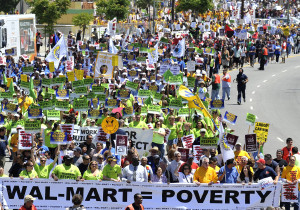 The Big Box Collaborative Campaign
The Big Box Collaborative Campaign
In 2003, a gathering of the top markets campaign organizations in the country unanimously concluded that if we wanted to have the greatest possible impact on corporations’ social and environmental practices, we needed a diverse, well-coordinated campaign targeting Walmart. CorpEthics and Michael Marx were funded to initiate this campaign. It began with the 2004 white paper, “Walmart: The Ultimate Lever for Major Corporate Change.”
This paper was circulated within the markets campaign community and resulted in the creation of the Big Box Collaborative (BBC). The BBC was comprised of environmental, human rights, community rights, women’s, community of color and labor organizations. It also played a role in SEIU’s creation of Walmart Watch.
By the end of 2004, the campaign posed a sufficient threat that Walmart’s CEO and several senior executives met with a small group of NGOs, including Michel Marx, representing the BBC. At the end of that all-day meeting, Walmart’s CEO, Lee Scott, committed to a six month in-depth evaluation of their environmental impact and opportunities for improvement.
At the end of that six months, in June 2005 his team reported back on the significant steps they were going to take to improve their environmental practices. They created 14 sustainability networks representing their various product lines. They invited NGOs who opposed them to join those networks to provide feedback on potential areas for improvement.
While Walmart continues to be a sustainability challenge due to its business model of pushing suppliers’ to reduce prices which often leads to cutting environmental and social corners, the company has made significant environmental improvements. It has a long way to go, but this campaign and Walmart’s response to it, rank as one of the seminal corporate campaigns of the last 25 years.


 The Big Box Collaborative Campaign
The Big Box Collaborative Campaign